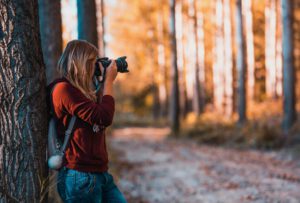A career as a photographer involves capturing moments, creating a visual story, and managing client relationships. Aside from a passion for photography, professionals from Designs have excellent communication skills, good customer service skills, and attention to detail. They also know how to manage all their equipment and files systematically and know when to compromise for artistic purposes. Ultimately, the goal of photography is to tell a meaningful story and convey a message to the audience. Photographers need to be flexible and detail-oriented, so they must be skilled at using computer software and know-how to edit images to display them on the Internet.
 A photographer uses equipment, computer software, and high-quality printers to produce images. Photographers use various techniques to create stunning images, including experimenting with lighting, incorporating special effects, and maintaining digital portfolios. They may also work in a studio environment or out, taking candid shots of events and people. Photographers choose camera equipment, lenses, and lighting equipment that will best serve the needs of their clients. Depending on their skill level, photographers can work for an academic institution, newspaper, or private industry.
A photographer uses equipment, computer software, and high-quality printers to produce images. Photographers use various techniques to create stunning images, including experimenting with lighting, incorporating special effects, and maintaining digital portfolios. They may also work in a studio environment or out, taking candid shots of events and people. Photographers choose camera equipment, lenses, and lighting equipment that will best serve the needs of their clients. Depending on their skill level, photographers can work for an academic institution, newspaper, or private industry.
Photographs have become a part of our everyday lives, from newspapers and magazines to advertising and posters. Similarly, they are ubiquitous in our social lives. Photographs can be found everywhere from social networking websites to passports and ID cards. And while photographs are an essential part of our daily activities, they also have a profound effect on our everyday lives. Photographs are used for so many things, from preserving memories to commemorating special events. The medium of photography is the best way to explore identity, memory, presence, and intimacy.
Photographers often work irregular hours. Some work full time during the spring and summer, while others work a limited amount during the winter months. Some photographers travel extensively to document specific landscapes or lifestyles. Several percent of photographers work for themselves. While photography may be the primary job of photographers, most spend much of their time marketing, obtaining clients, and collaborating with other professionals. In addition to taking photographs, they spend a significant portion of their time developing their portfolios.
Photography equipment is essential to their success. While most photographers use digital cameras to capture images, some used film. Photographers also use various pieces of equipment to enhance and manipulate their pictures. This equipment can include cameras, tripods, filters, and special lighting equipment. Some photographers even use drones equipped with cameras. Regardless of the equipment they use, these professionals need to be skilled in computers, high-quality printers, and editing software to make their pictures perfect.
Good composition is another key to a good photograph. There are certain rules of composition to follow, but creativity is the best guide when it comes to creating a stellar composition. Photographers with a keen eye for detail must ensure that all elements of an image work together harmoniously. Whether using digital or traditional film, a good composition can make or break a picture. Once all these aspects are in place, the photographer is ready to capture the perfect moment.
The number of jobs for photographers is expected to decline 8 percent by 2026. This decline is primarily due to the growing popularity of digital cameras and the increasing number of amateur photographers. Despite this downturn, the number of photographers who choose to work on their own is expected to increase by 12 percent by 2026. However, there is a high level of competition for most jobs in the industry. Despite these declines, photographers will continue to be in demand as long as there is an increasing interest in digital photography.
Self-employed photographers can also benefit from learning image editing and marketing skills. Many online courses can help them develop their photography skills. Often, photographers work on their own, in a freelance capacity, or have their businesses. If you’re not interested in being your boss, you can use your photography skills in related areas, such as graphic design, marketing, and web design. Other careers in photography include publishing, teaching, and creative arts.
Royalties for photographs can vary. This fee depends on the use of the photograph and the industry that purchased it. For instance, a poster may command a higher royalty than a brochure with a limited run. Another consideration is the size of the photo used in the publication. Cover photos usually command higher royalties than those used elsewhere. Ultimately, royalties can vary widely depending on where the photo is used. In addition, royalties for photographs used in commercial projects are lower than those for noncommercial use.

